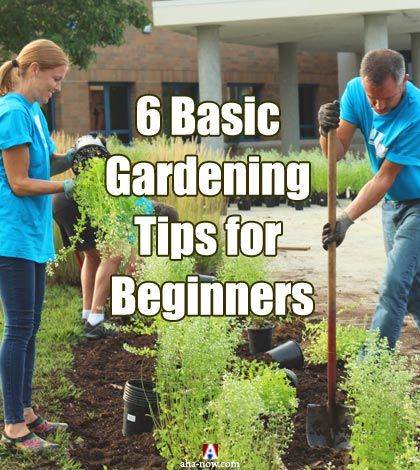6 Basic Gardening Tips for Beginners

Table of Contents
Gardening is a wonderful hobby. If you’ve access to a garden, you can plant grass, shrubs, and vegetables. However, as there are certain basics involved in doing any activity, there are some things you need to know about gardening before you start out. Here are the basic gardening tips for beginners to help you start with your garden and keep it bountiful. ~ Ed.
Having a garden can be a blessing or a chore, depending on what you do with it.
But what many people don’t seem to know is that there are a few go-to steps to enjoying your garden’s best gifts without costing an arm and a leg, and without having to spend too much time caring for it.
If you are really eager to enjoy and make the most of your outdoor space and make your garden really live to be the best that it can be, then there are a couple of things that you need to do.
We understand that having a garden doesn’t mean that you necessarily know how to take care of it, so we prepared a few points for you to keep handy when you embark on your next gardening activity.
6 Tips of Gardening for Beginners to Keep Your Garden Bountiful
You may like gardening but are not sure how to and where to start from. While this is not a complete guide on gardening, here are the basics of gardening that you should know.
Know What You’re Planting
The first thing you need to do is to think about what kind of garden you’d like to have in general.
Do you want to have a full-on functional garden that provides you with fresh food, a garden in which you can tend to different kinds of flowers, or do you just want a simple, green layout for the family to play in? Once you’ve decided, it then becomes much easier to get down to business.
Do your research by looking for tips on the internet and consult with people you know are seasoned in gardening so that you can have the information you need to make a fully functional plan for your garden.
Have a Support System
Doing everything yourself might sound simple, but it’s always a good idea to have a professional check up on your garden every once in a while, just to be sure that you’re going in the right direction.
Choose a company that provides a wide range of offerings and familiarize yourself with the services they offer, for when you need your lawn managed.
Not only will a professional get your lawn mowed, but they can take a look at your garden while they’re there, evaluate the situation, let you know what needs to be done.
Know that Wind and Sunlight are Important Factors
If you’re planting anything other than just grass, then you have to be smart about where you place your plants.
If you want flowers, for example, then you will want to plant in a relatively flat area. Taking care of a sloping garden is challenging, time-consuming, and can even be costly.
Depending on where exactly you live, you might also want to consider having it by a windbreak—like a wall—to protect your flowers from strong winds.
Another aspect to pay attention to is sunlight. Most plants need about six to eight hours of sunlight to blossom, so depending on your choice of plant, the location may vary. If sunlight isn’t plenty in your yard, then you may want to select plants that don’t need that much and can flourish in the shade.
Maintain Your Blossoms
Whether you chose to grow flowers, grass, or vegetables, you have to research the best approaches to maintenance. In addition to watering schedules, trimming and removing weeds and other parasites are all necessary aspects of your maintenance routine.
So know your chosen plants well and keep a journal of your to-do’s and their timing.
Keep the Soil Fertile
Most yards come with soils that just don’t have the correct nutrition that will help in having you grow healthy plants and vegetables.
To keep your garden grounds in the best condition to promote growth, you need to look into finding out what fertilizer and generally what kind of organic options you need to keep it suitable and healthy at all times.
When we talk about organic options, this usually means things like compost or manure, amongst other things. A professional can also help you learn how and when to do this for the best results.
Invest in Some Tools
Off the top of your head, you’d probably think of lawnmowers, gloves, pruning shears, hedge shears, rakes and soil forks as your primary tools. This, however, will solely depend on the kind of plants you’re growing and the amount of involvement you plan on having yourself, in contrast with hiring a professional to take care of the yard for you.
If you plan on doing everything yourself, then you might want to consider starting out with those items and adding as you go, based on your extended research and the needs of your garden.
Wrapping Up
Generally speaking, for you to enjoy a healthy garden that’s bountiful most of the year, you should always do some research, read up on the matter, and speak to a professional gardener or service provider near you.
It’s always a good idea to get some help along the way to get the best out of your garden.
Over to you
Do you love gardening? If you’re an experienced gardener then do share your tips, thoughts, and suggestions in the comments to help the beginners.
Disclaimer: Though the views expressed are of the author’s own, this article has been checked for its authenticity of information and resource links provided for a better and deeper understanding of the subject matter. However, you're suggested to make your diligent research and consult subject experts to decide what is best for you. If you spot any factual errors, spelling, or grammatical mistakes in the article, please report at [email protected]. Thanks.











Amazing gardening tips provided, I loved this post, and got to know many things about gardening tools. Will try this tools that you listed this summer!
Thanks for the tip of first figuring out what type of garden we want. We just moved into our new home a couple of weeks ago and my wife really wants to beautify our landscaping, specifically by adding a garden. I have no idea how to garden, so thanks for the advice of having a professional to look at our garden. We have a good spot that we want to start at, but there is a huge tree there and is taking up much-unwanted space. We plan on hiring a professional that could remove the tree so that we could start building our garden.
Hello Allen, thanks for your article. My Mum recently retired, moved back home and we we’re thinking on what to do with the garden out front. It is true about the tip on knowing what we need to plant through research and consulting. Since she wants to do one thing and I want her to do another. We found your article very helpful and insightful. Thank you.